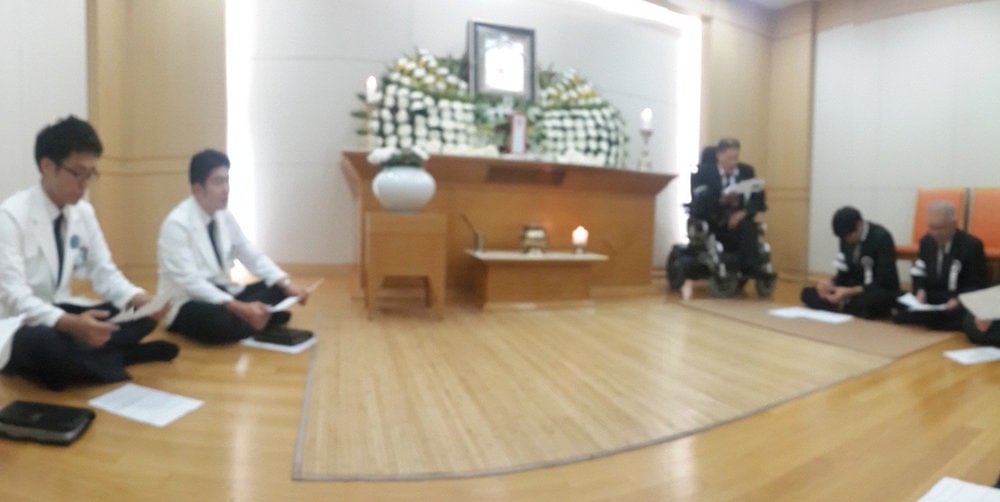
South Korean physician Sungsik Ha didn’t believe in God even though he had worked for three decades at the Seventh-day Adventist hospital in Seoul.
Then one of his in-laws died, and Ha listened to a hospital chaplain lead the funeral service in the hospital’s gleaming marble funeral home. He was deeply moved to hear the chaplain speak about the promise of Jesus’ Second Coming and the hope of resurrection.
A short time later, Ha’s other in-law died, and he again attended a chaplain-led funeral. His heart was touched again by the message of hope.
Ha began to read the Bible and, several months later, was baptized into the Adventist Church.
“I worked my whole life as a medical doctor here,” Ha, a squat man with a kind smile, said in an interview at the Sahmyook Medical Center-Seoul Adventist Hospital, where he now serves as chief medical officer.
“The hospital had kind of an irresistible attraction on me,” he said. “I gradually became an Adventist.”
Serving as Jesus’ healing hands — and introducing people to the Savior — has been the mission of the Sahmyook Medical Center, or SYMC, since its origins as a simple cottage clinic established by the first Adventist medical missionary to Korea, Dr. Riley Russell, in 1908. Another American missionary, Dr. George Rue, moved the clinic to Seoul in 1932 and transformed it four years later into a 40-bed hospital and nursing school.
Today, the 426-bed general hospital has a staff of more than 800 people who treat half a million patients a year. The hospital also operates a 120-bed nursing home and the funeral home, a luxurious, two-story facility with private apartments where families stay for three days at a time as they mourn the loss of loved ones. Many families also hear an encouraging message of hope from a hospital chaplain.
Read related story: Biggest Language School Seeks Adventist Teachers as It Renews Mission Focus
To understand how the funeral home works requires an understanding of the Korean National Health Insurance System, which was created in the 1970s. Koreans initially expressed reluctance to subscribe to the insurance plan, prompting the government to set the price at a very low level as it urged people to join. Now nearly every Korean is covered by the insurance plan.
The insurance plan may remain inexpensive, but medical reimbursements from the plan are also small, said Ji Yoon Lee, the Adventist hospital’s associate director of planning. A colonoscopy without anesthesia, for example, is less than $100.
“It is almost impossible to change this pricing system, so a health-care business cannot make a profit from its core activity — healthcare,” Lee said.
Instead the government gave permits to hospitals to operate funeral homes. Koreans tend to splash out a lot of money on funeral services, making the funeral home business highly profitable, Lee said. The Adventist hospital is no exception.
“The hospital’s bottom line is usually breakeven or a loss, with some exceptional years of net gains,” Lee said. “It is the funds from the funeral home that keep the consolidated bottom line profitable.”
The funeral home conducts 20 to 30 funerals a week, with Adventists accounting for 14 percent of the services. The rest are a mix of other Protestants, Buddhists, Catholics, and others. Families may invite their own cleric to conduct the funeral, but the hospital’s two ordained Adventist pastors and a junior pastor are also available.
“It is a dramatic time for these families, and they are feeling lonely,” said Yung Han Yoon, the hospital’s chief chaplain. “Most of them have no hope after the death of a loved one. I share a biblical message of hope about life after death. This is new to them.”
After the funeral, the hospital connects the family with the nearest Adventist church, and church members reach out to the family in the following days and weeks. Among the people who have been baptized through the work of the funeral home is a popular Korean movie actor whose heart was touched by his brother’s funeral, Yoon said. The brother also was baptized shortly before his death.
The funerals also affect the funeral home employees. Yoon said 99 percent of funeral home staff who were hired as non-Adventists end up being baptized.

The hospital lacks sufficient Adventist staff to meet its needs. About 70 percent of staff members are Adventist, a number that is decreasing as young Adventist doctors and nurses join larger Seoul hospitals such as Samsung Medical or Asan (Hyundai) Medical, Lee said. Fifteen of the hospital’s 60 doctors are Adventist.
But the hospital also has a vibrant chaplaincy service consisting of the three pastors and a full-time deaconess, all of whom are employed and sent to the hospital by the church’s East-Central Korean Conference. Their salaries are paid by the hospital.
The deaconess in particular is a great help, especially when the male pastors are not able to visit female patients for various reasons, Lee said.
Under the model adopted by the hospital, the deaconess first befriends a patient and, after becoming familiar with his or her needs, arranges a visit with a pastor or invites the patient to study the Bible or join a worship service.
The pastors and deaconess lead more than 140 people to baptism every year, Lee said. In 2014, when Dr. Ha was baptized and the latest year for which numbers are available, the hospital baptized 174 people.
Among the hospitalized patients who have been baptized is Jinsook Park, who was diagnosed with colon cancer during a medical checkup. Park had surgery at another hospital because of an allergy but returned to the Adventist hospital to recover.
“Repeated visitations by the pastors gradually opened her heart and she studied the Bible,” Lee said.
Park was baptized at the hospital and immediately began to share her newfound faith with other patients. Five people have been baptized through her efforts, Lee said.
“She is still very healthy and actively leading people to Christ,” he said.